Abstract
This commentary is the result of a long-distance creative writing project between young general practitioners (GPs) from around the world. They wrote this after participating in an exchange program in Turkey, where they had the opportunity to shadow a Turkish GP, and talk about primary health care around the world. This program was organized by the Vasco da Gama Movement (Vasco da Gama Movement is WONCA Europe's Working group for New and Future GPs: http://vdgm.woncaeurope.org/).
Keywords: Fear, friends, general practitioners, Turkey
Prelude: Meeting over the Ottoman Recipes
We do not choose our parents and our homes. We do not choose our nation, but we can choose our destination. We can choose which countries to visit and people to connect with. As a group of young general practitioners (GPs) from different countries, we chose to be a part of the WONCA Europe preconference exchange in Turkey. After a fully packed exchange program, we all met at a restaurant.
I, Indra, a 25-year-old doctor from Belgium was one of the participants. I arrived later than the others, and as soon as I opened the door of the restaurant, the sounds of laughter and the echoes of people's voices greeted me; the smell of Eastern spices, garlic, and grilled meat made me even more hungry than I already was. The Chef of the restaurant shook hands with everyone and welcomed us to his traditional restaurant with a big smile. He would serve us the food the ancient Sultans used to eat. It was a Tuesday, October 20, 2015. Ten days after the deadly terrorist attack in the capital of Turkey. Eleven days before the one on the Russian airplane and 3 weeks before the attacks at Beirut and Paris; but we did not know the latter yet.
The feelings we all shared on that Tuesday were different from what prevailed in the days preceding the exchange. Then, organizers and participants were anxious about the political situation in Turkey and its security implications after the blast. Our friends and family were worried and though some of the participants canceled the trip, the majority thought otherwise. We all had questions about the new dangers of daily life in Turkey but here we were, all together eating the original recipes of the Ottoman Sultans. We felt powerful, enriched, and united as we could already feel that this encounter had become another milestone event in our lives. That sunny afternoon in Kadıköy, Istanbul's ancient district on the Northern Asiatic shore, we all had our stories to share.
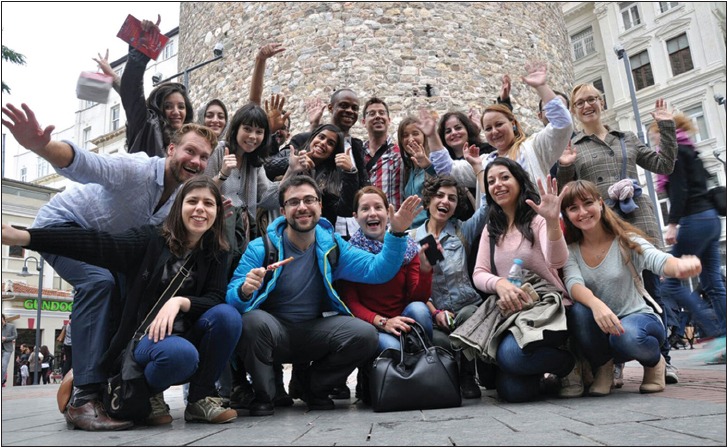
Exchange Participants at Galata Tower
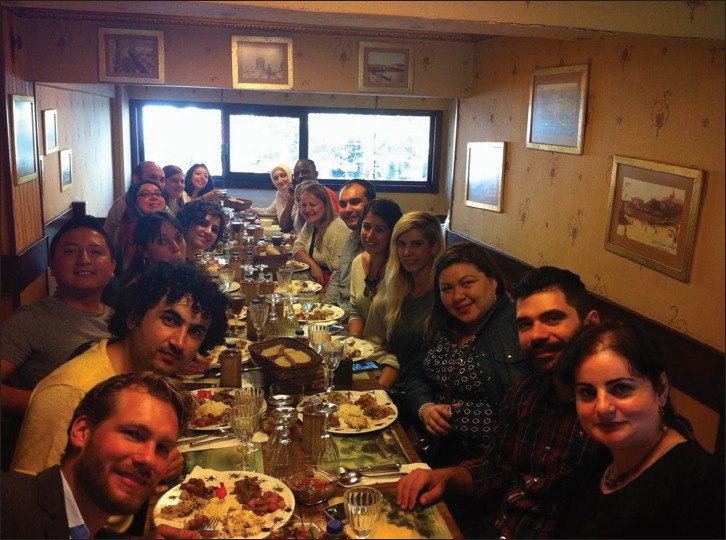
Exchange participants having lunch at a restaurant in Istanbul
Connecting with Family History during the Exchange: Kiriaki
Alexandra, a Greek GP, told us with twinkles in her eyes about Kiriaki, her great grandmother lived in Turkey as a young woman. She used to narrate stories from her life in “The City” referring to Istanbul. Initially, Kiriaki would have a wrinkle or two on her forehead but then they quickly disappeared as she put on a smile and portrayed how happily and peacefully they lived with the Turks, her loving neighbors and best friends. How they would gather in the late afternoons to share çay, tea, together with their every day's burdens. The fruits she used to cultivate in her home garden were huge and tasty, and Kiriaki described them in a lively way. As a child, Alexandra imagined they were even bigger and now, years later, she only had to close her eyes to remember their bright colors and taste. Although her great, in many ways, grandmother had already died, Alexandra kept on dreaming about “The City” and although she planned it several times, she was only able to embark on her first journey to Istanbul during this exchange.
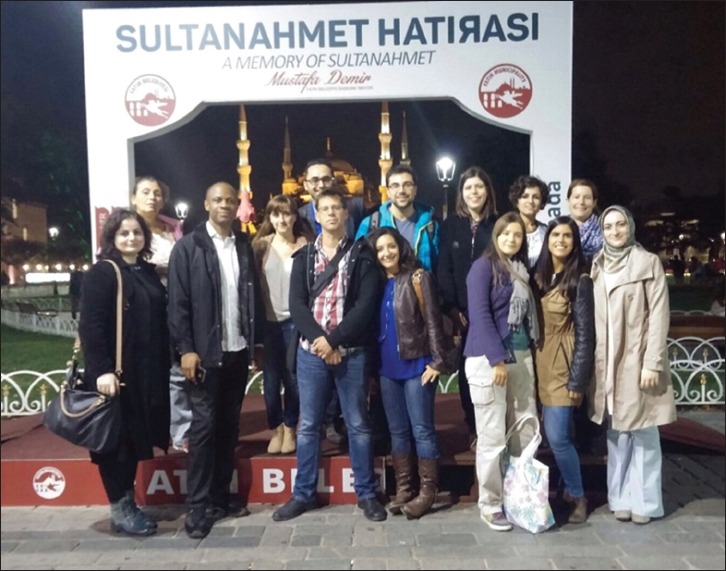
Istanbul Exchange Participants at Sultanahmet Square
The General Practitioner and Life's Uncertainties: “in Sickness and in Health”
While Alexandra told us about her ancestors and the meaning of Istanbul to her family, some of us were thinking about the future. Just before arriving, Beatriz from Portugal had just like me started working as a GP-trainee. We wondered if the perfect GP existed and if he/she existed, how perfection was attained. How could he/she cope with the long working hours and yet be up-to-date on the latest treatment guidelines? What about being able to help patients even when we do not know all the answers?
Beatriz told us about an experience with Dr. Özgur, the GP she shadowed for 1 day: “we had just returned from our lunch break” she said, “it was a warm and beautiful day. The sky was blue and the gentle breeze could be heard whistling through the leaves of the autumn colored trees.” She remembered one particular consultation during which Dr. Özgür had to sign a medical certificate for a young Turkish lady.
”She was about 30-year-old with eyes black as the night. She seemed worried as she kept fidgeting and talked in a loud and excited manner.” Beatriz paused for a bit and then continued, “as they were speaking in Turkish, I could only imagine what they were saying. The woman showed Dr. Özgür some papers who then went ahead to print out the results of her blood tests. Afterward, Dr. Özgür started opening the different drawers of his desk as he seemed to be searching for something. He said something in Turkish to the woman and went knocking on his colleague's door. He came back with a big smile and I guess he said something like 'There you are, I found it!’ Only then did the woman smile and the muscles of her face suddenly relaxed. Dr. Özgür proceeded to stamp and sign the document he had just found in a lively way that showed he too was relieved. Afterward, he explained he had given a marriage certificate to her.” I guess some of us looked surprised when Beatriz spoke out the word marriage certificate because she further explained: “In Turkey, whether you are a man or woman, you should be examined by your GP and get a certificate that states you are in good health before you can get married.” Culturally, it is a generic way to screen and diagnose diseases in young people that probably had never done any health checkup before. Beatriz could not hide her worries with this kind of practice: “What if you are not healthy? What if you have diabetes, hypothyroidism, or a sexually transmitted infection? What happens? Should a disease hinder your relationship? What about In sickness and in health, until death do us part? What are we as GPs supposed to do in this kind of situation?”
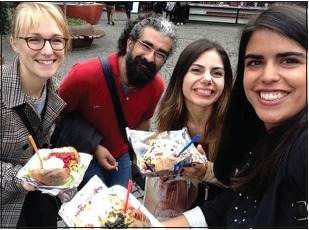
Natalie, Dr Özgur, Saba and Beatriz having Kumpir for lunch at Besiktas
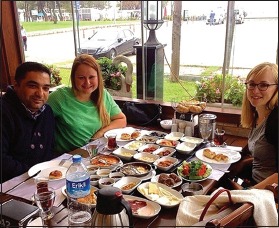
Ibrahim, Nurşah, and Natalie having a Turkish Breakfast
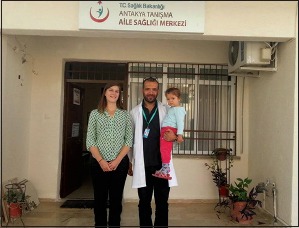
Indra and her host (Dr. Kanuncu) at the Health Center in Hatay
Friendship: A Unique Experience for the Organizers of the Exchange
The atmosphere had become pensive and I was glad when Nurşah, one of the hosts, offered to share her own experience during the exchange. I thought her experience would reflect the stress associated with organizing an exchange. I was surprised when she said she had rediscovered her hometown and culture during our stay. She went on to explain: “all of the venues for the social programs were so beautiful and lots of them were new to me too. Finding them was really hard even though I had lived in Istanbul for 13 years. Funny enough, it was a participant from Switzerland who often helped me find directions in the subway and on the boat lines. Viewing the city through the eyes of a tourist let me discover new places and changed some of my original thoughts about it.” This livened the mood at our table; especially as Süheyla, one of the organizers of the exchange, told us how much we, the participants, had contributed to their success. She was worried about her responsibilities and what surprised her most was that in the middle of all her worries, she got the largest support from us, the participants. “You were eager to make the work easy for us,” she said. “You were very cooperative, very cheerful, very understanding. I think, you do not even realize that you were the ones who calmed me down during my most stressful moments.” Her speech touched me as I did not realize how emotionally tasking all these had been for her.
Dealing with Adversity as a General Practitioner: My Experience at a Turkish Town near the Syrian Border
It was now time for me to share my experience. I had spent 3 days in Hatay and this had a profound effect on me as a young Belgian GP. After arriving by plane, we had to complete the rest of the journey to the health center by road. We drove Eastward on the highway. I later on saw the sign “Halep 99,” indicating how many kilometers we were from the largest city in Syria. Due to the security concerns at Syria, it felt unrealistic but also exciting to see this road sign flash by. After exiting the highway, we drove on an untarred road that took us to a remote health center. I saw the mountains by which one could easily have crossed the border into another world, one with a totally different political situation. As we drove through this hilly landscape, I could see the minarets of the villages appear after every loop the car took, I could not stop imagining what it was like to be a GP working here. How would I cope with the cultural differences? The ensuing days offered a variety of experiences. I got to learn that the national vaccination program was the responsibility of the GP. If I was a GP here, I wondered how I would organize vaccination for children in this community, since most of their parents could not even read the vaccination scheme. I also thought about how to reach vulnerable Syrian refugees who had no residence permit and endured terrible working conditions. The questions kept coming as though I was already a GP working here, I was no more a visitor; I felt responsible.
Not every GP would be willing to work in a rural center at <50 km from the Syrian border. Luckily, my host also had supportive colleagues working nearby. He was passionate about his profession in a way I had rarely seen. He sincerely questioned the safety of his working place and certain aspects of the health system, but this did not stop him from showing me the beautiful scenery they had. Especially, in this season where everyone was busy harvesting olives.
Final Reflections: The Importance of Freedom
Still here at the busy restaurant, our international group of GPs had become quiet. We were satisfied with each other's stories and the marvelous food we had eaten. The coffee grounds were waiting to be read. We had smiled as we listened to the tale of Alexandra's great ancestors, this also made us think about our beloved ones. We were glad to know we were not the only one who learned something new; our Turkish hosts had also learned from us; it had been an exchange in many ways. Just like Beatriz, we still did not have answers to the issues we had encountered during our stay. At the same time, I thought of one solution I came up with while at Hatay: What about asking the Muezzin of the Mosque next to the remote health center to inform the people of the village via the minaret, about which children had to be vaccinated that day? For my host and the patient population in his region, it turned out to be a very effective way to promote child health.
When you open your eyes to observe, when you open your mind to understand, and when you free your mind to make place for creativity, you will find solutions. We learned about each other's habits and cultures but also about each other's incertitude and fears. We decided we did not want terrorism to dictate our lives. We had a strong inner desire to be a part of this exchange despite the fears. We wanted to show solidarity to the Turkish people and the families of the victims but most of all we wanted to show ourselves and the rest of the world how important freedom is to our generation.
Financial support and sponsorship
Nil.
Conflicts of interest
There are no conflicts of interest.


